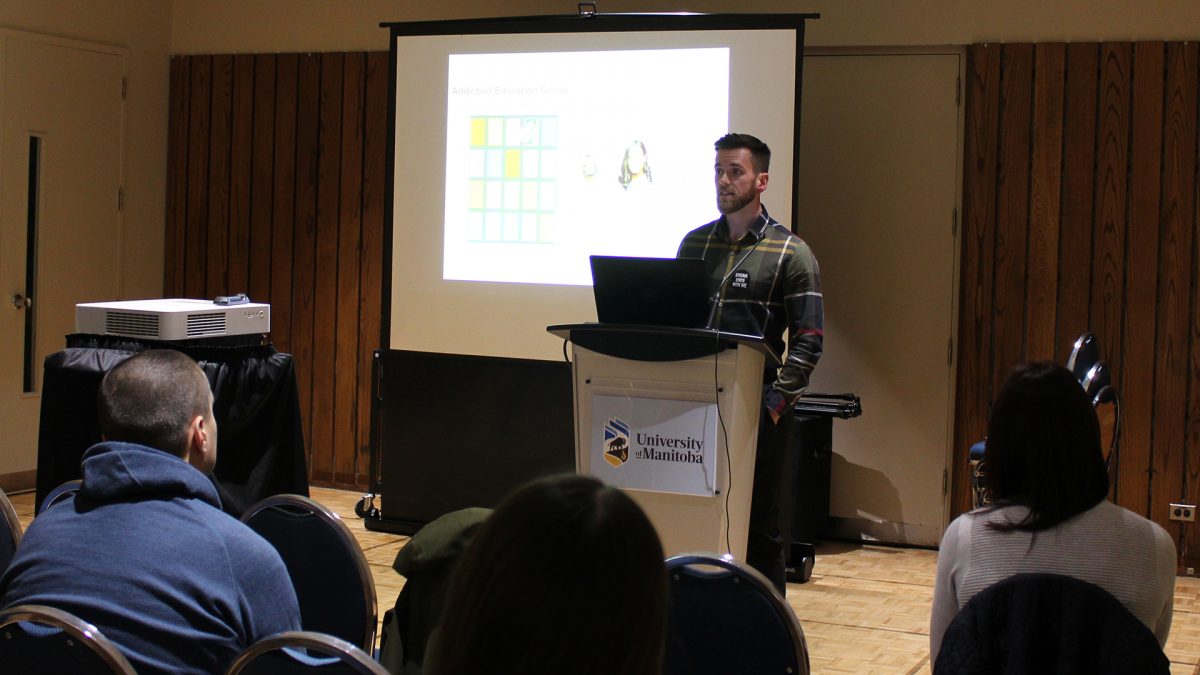
Medical student Alex Sharp gives an overview on the advocacy efforts of the Manitoba Medical Students’ Association’s addiction education group.
First Addictions Awareness Day advocates for ending stigma around addiction
A new event on campus is aiming to spread awareness and reduce stigma around addiction and substance abuse.
The first Addictions Awareness Day was held at the University of Manitoba on November 25, 2019, hosted by the department of Community Health Sciences, Max Rady College of Medicine and the Rady Faculty of Health Sciences. The day was held in recognition of the Canadian Centre for Substance Abuse and Addiction’s National Addictions Awareness Week (November 25 to Dec 1) which highlights issues and solutions to help address alcohol- and other drug-related harm.
This year’s theme was Stigma Ends with Me, which aims to increase understanding of the devastating stigma associated with substance use and addiction and its impact on the well-being of people touched by this health issue.
The event was organized by Dr. Tamara Taillieu, an instructor with community health sciences. She dedicated the event to her niece, Destiny Taillieu, who died in November 2018 from an accidental fentanyl poisoning. Taillieu is also a member of the recovery community and often shares her story – and Destiny’s story – in some of her classes.
“Issues related to substance use and addiction affect so many people, including students, staff and faculty on our campus,” said Taillieu, “Going forward, I hope Addictions Awareness Day can grow and become an annual event at the U of M. I hope it will bring together students, staff, faculty, and community members to talk and work together to address issues related to substance use on campus in the wider community.”
The event included a resource booth set up in University Centre, a screening of the documentary “Painkiller: Inside the Opioid Crisis,” and speakers sharing lived experiences and stories of hope and recovery.
During his opening remarks, Dr. Stephan Moses, head of community health sciences, said, “As an institution of higher education, we have an important role to play in spreading awareness and education on issues related to addiction and in supporting research and practical programs aimed to uncover the most effective ways to prevent substance use.”
Two medical students, Alex Sharp and Diana Craig, presented on the advocacy efforts of the Manitoba Medical Students’ Association’s addiction education group. Sharp founded the group two years ago and Craig currently serves as president. Both students have had their lives touched by addiction.
“We wanted to change the way people think about addiction. Addiction is a disease,” said Sharp, “We want to reinforce that idea amongst our colleagues from the very start so when they do become doctors, it’s not new to them that this is a disease that needs to be treated.”
Over the past two years, the group has invited experts in addiction medicine to share their expertise and people with lived experiences to share their story with students.
“It’s harder to label someone as ‘just an addict’ and stigmatize them when you’re looking them in the eyes and hearing their story,” said Sharp.
Craig added, “As a future physician, as a medical student, I want to meet people with non-judgement and compassion. Even though I can’t end their suffering, I can be present for it. That, to me, is harm reduction.”
The group has also organized fundraising events (raising $500 for the Bear Clan Patrol last year), and participated in Provincial Lobby Day last April to advocate for more attention on harm reduction.
Dr. Ginette Poulin from the Addictions Foundation of Manitoba gave a presentation on addictions medicine.
“As much as we want to believe it touches people ‘over there, it’s those people in the street,’ the reality is that it touches every single one of us, whether it’s our own family member, a loved one, a colleague. There is no immunity when it comes to addictions and so it’s about time we start talking about that,” said Poulin.
Other speakers included representatives from the group Overdose Awareness Manitoba, who told personal stories about their experiences with addiction, and a representative from the Health and Wellness Office gave an overview on the University of Manitoba’s substance use and harm reduction initiatives and resources.
Manitoba Addictions Helpline: http://mbaddictionhelp.ca/






